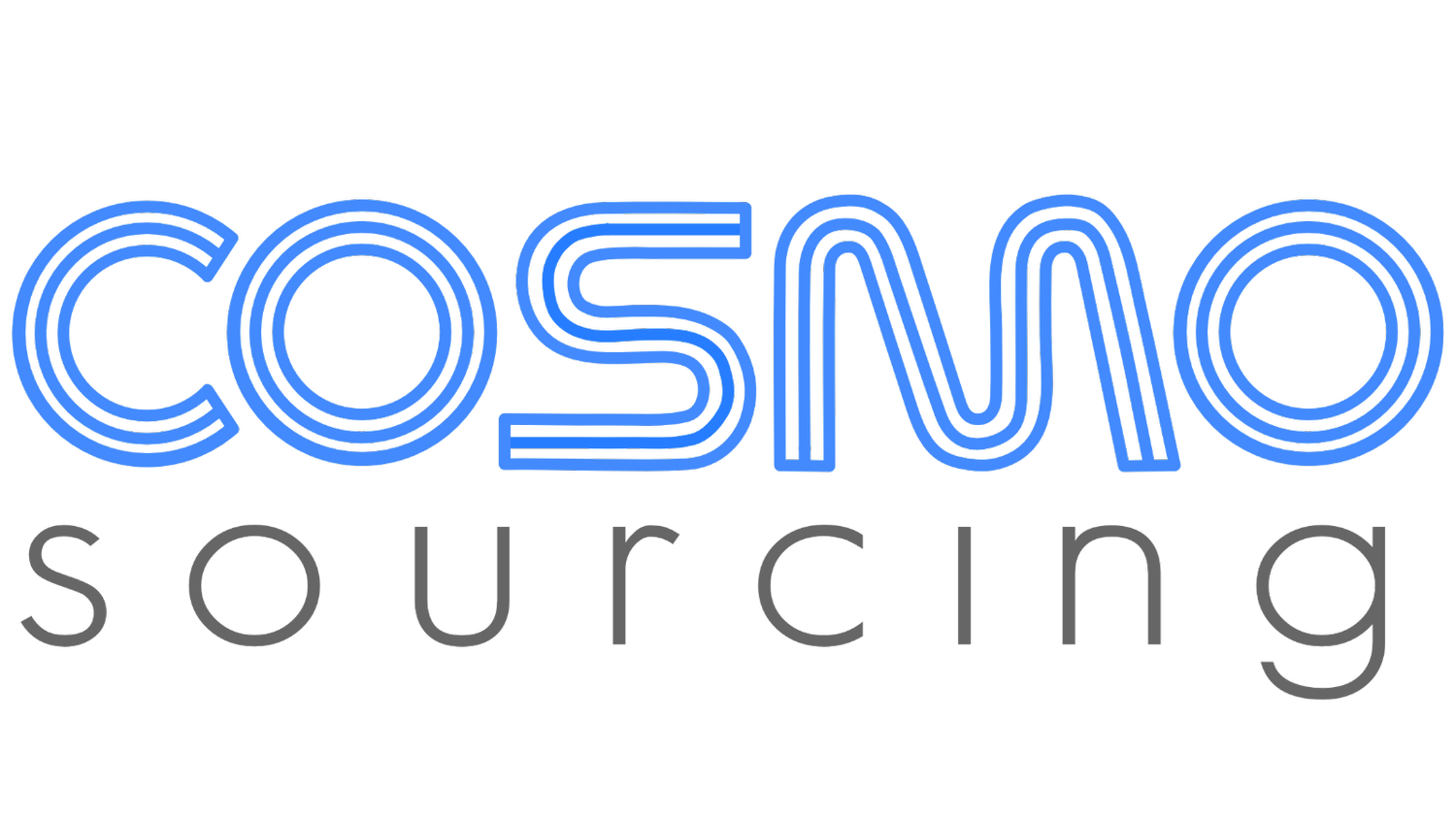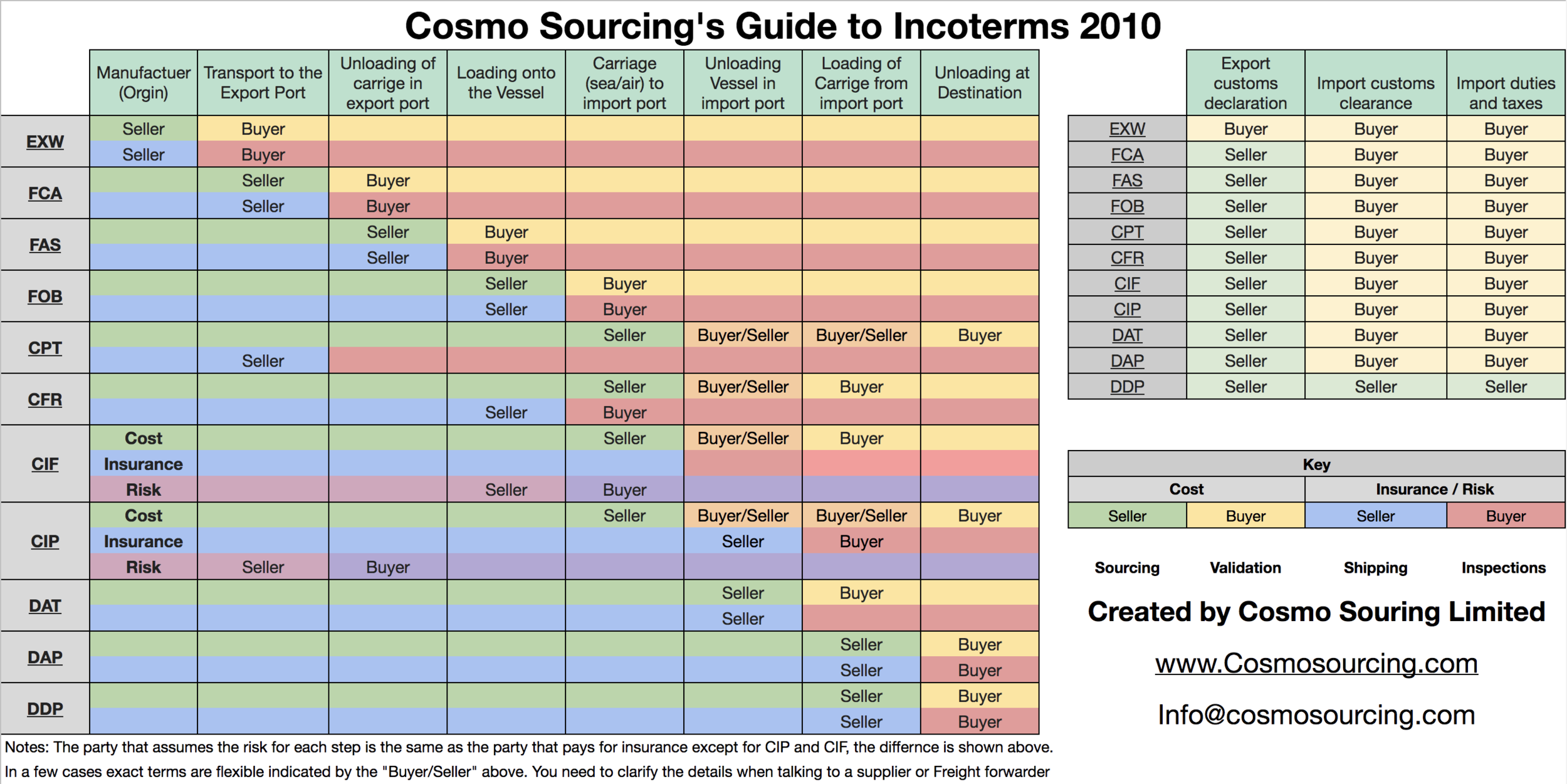Incoterms, Shipping, and Trade Terms Defined // FOB, EXW, FCA, CPT, CIP, DDP, etc.
Are you unsure about the trade terms of Alibaba or Chinese suppliers? Don't know what the three letters that came with your quote mean? Cosmo has defined the 2010 Incoterms abbreviations, such as FOB, CFR, and DAP, for international trade.
When you're getting quotes from suppliers, they will almost always give you three pieces of information: the price per unit, the MOQ (minimum order quantity), and the shipping terms. The shipping terms, incoterms, are usually given as three letters at the end. For instance, this is a quote I recently received, "1000-1.75/pc, 2000-1.65/pc, 10000-1.50/pc, EXW." In this case, the EXW stands for Ex-Works and defines the shipping terms and the obligation of the buyer or the seller to get the product to its final destination. People often ask us if Alibaba prices include shipping. The answer is no–they almost always quote prices in EXW on the website.
[UPDATE] Click here for the new Incoterms 2020
Incoterms are international contracts of sale, often called trade or shipping terms. Incoterms are shot for International Commercial Terms EXW and FOB and are far from the two most common incoterms. Incoterms have two parties, 'the buyer and 'the seller.' 'The seller' is typically a factory, manufacturer, trading company, or wholesaler. 'The Buyer is the person who purchases the goods from overseas and imports them for final sale. If you run an FBA business, you will be classified as the buyer in these examples. This guide is for the most recent incoterms, updated in 2010. There are now 11 recognized terms, down from 13 in 2000. Incoterms are published by the International Chamber of Commerce (ICC), which holds the copyright.
Steps of the shipping process
Ten steps in the shipping process need to be completed to get a product from a factory to the final destination.
Transport to the export port
Unloading the carriage in the export port
Loading onto the vessel
Export customs clearance (to clear for export)
Shipping on the vessel (such as ocean shipping or plane)
Unloading the vessel at the import port
Import customs and clearance
Import duties and taxes
Loading of the carriage in the import port
Unloading at the destination (terminal)
The buyer defines the final destination, and if you are an FBA seller, that typically would be either Amazon's warehouse or a prep and ship center. The incoterms explain who is responsible for doing each action. For example, it's widespread for a buyer or seller to hire a freight forwarder to do the shipping for them.
Note about freight forwarder:
We should note that most shipping steps are not done by the seller or the buyer but by a freight forwarder. However, depending on the trade terms, the buyer or seller must find and pay a freight forwarder.
Trade terms defined
Before we get into the incoterms, there are a few words that need to be defined:
Seller: Typically, the manufacturer, trading company, or wholesaler supplying the goods for sale.
Buyer: The person purchasing the goods will receive them upon final delivery.
Delivery: The point at which the risk is transferred from seller to buyer.
Arrival: The point when the delivery has been paid. The seller should name the place.
Free: How far is the seller obligated to deliver the goods to be picked up by the buyer?
Carrier: The party that is obligated to transport the goods. This can be done by any means necessary, for instance, by ship, rail, or truck.
Freight Forwarder: A firm that is commonly contracted to make shipping arrangements.
To Clear for export: When export permission is granted.
Terminal: The shipment's final destination, such as a dock or warehouse. For FBA sellers, this is most commonly an Amazon fulfillment center.
Incoterms defined
As EXW and FOB are the most common, we’ll start there. When we ask for initial quotes from manufacturers in our RFQs, we request they quote prices in EXW and FOB. Why? We want to know the EXW price, as that is the price of just the product itself. The FOB is to gauge the shipping prices and because the export port is a good place for our freight forwarder to pick up an item. Most of our projects are FOB; we contract with a freight forwarder to complete the rest of the shipping.
EXW- Ex-Works
FOB is the most basic shipping Incoterm that a supplier can provide. The seller makes the item available to pick up at the factory and is not responsible for the product once it leaves the factory doors. Instead, the buyer is responsible for transporting it from the factory, covering all export and import clearances and insurance costs.
Suppose you are getting initial quotes from a factory for the first time. In that case, they will almost always give you a quote for EXW unless you explicitly ask for it in another term. Factories and suppliers usually quote in EXW because it’s their lowest price, and it looks good when comparing quotes and needing the lowest price.
FOB - Free on Board
FOB means that the seller ships the goods to the nearest port, and the seller is responsible for everything after that. The seller will drop this off at the port of shipment, and the buyer will either pick it up themselves or, more commonly, work with a freight forwarder to ship it for them. The seller is the one to clear the goods for export, and the buyer is responsible for the goods from the port onwards. So it’s essential when getting FOB quotes to ensure you get the port’s name where they drop the goods off.
One of the big reasons this is the most popular Incoterm used is that the Export port is an excellent place to have a 3rd party inspection service inspect the goods. Further, the seller is responsible for all activities in the country of export. Simultaneously, the buyer is responsible for all activities once the goods leave the country, which makes things simple. In addition, most freight forwarders will have an office at or near the port, and it’s an easy spot for them to pick up the goods on your behalf.
FCA - Free Carrier
FCA is just one step up from EXW, in which the seller clears the goods for export and delivers the goods to the port of export. Next, the buyer has to unload the goods in the port and is responsible for them once they reach the port. Next, the buyer arranges the carrier. The most significant difference between EXW and EXW is that the seller must load the goods on the buyer’s carrier. It should be noted that this is often confused for FOB–feel free to ask your supplier to elaborate and give details.
CPT - Carriage Paid To
The seller pays for the goods shipped to the buyer’s chosen import port. The risk is transferred to the buyer once the goods arrive at the port. The buyer is responsible for unloading the vessel and arranging further transportation. Even though the seller is responsible for the export port’s cost, the buyer assumes the risk and insurance cost once the goods are unloaded at the export port. The seller is responsible for export clearance and freight costs.
CIP - Carriage and Insurance Paid To
It is effectively the same as CPT, except the seller is required to obtain insurance for the goods during transit. CIP also covers all modes of transportation, while CIF is specifically for sea freight. We should note that CIP and CIF are the only ways risk and insurance differ. Once the goods are unloaded at the export port, the seller assumes the insurance cost but not the risk until the goods are unloaded at the import port.
DAT - Delivered at Terminal
The seller delivers the goods (unloaded) to the import port, and the buyer is responsible for the cost and risk of the goods from that point on. The seller takes on all risks or costs associated with the goods until they reach the import port. Then, the buyer pays for imports and customs.
DAP - Delivered at Place
The seller delivers the goods to the buyer’s final destination. The seller assumes all risks with the shipping and either loads or pays a third party to load the goods for shipment. The buyer is only responsible for paying the customs fee and clearing the goods for import. The buyer also pays to unload the goods at the final destination.
DDP - Delivered Duty Paid
With these terms, the seller pays for and is responsible for everything. The seller pays all costs and assumes all risks to the final destination. The buyer is only responsible for unloading the goods once they arrive at the final destination chosen by the buyer.
We often get asked why we do not get every project DDP. While it is the easiest for the buyer, it is certainly not the cheapest. The seller picks the shipping company and will choose the one they like best, not the cheapest or most reliable for you. You are putting a ton of trust in the shipping company. I would suggest getting a quote for DDP from your supplier, a quote for FOB, and a quote from a freight forwarder and then comparing the final total price of the two.
Note: FOB, FAS, CFR, and CIF are specifically for waterway-based shipments (both ocean and inland waterways), while the above is for all forms of shipping, including water. Other forms of transportation can include rail, trucking, or air cargo.
FAS - Free Alongside Ship
The seller is responsible for delivering all goods to the vessel’s side at the named export port. The seller pays for and assumes all risks until the goods are placed in the port and cleared for export. The buyer then takes on all costs and risks from that point on, including loading the ship. This has one less step than FOB, in which the buyer bears the cost and risk of loading the ship.
CFR - Cost and Freight
The seller is responsible for bearing the shipping cost until the named import port. However, the risk is given to the buyer once the goods are loaded onto the ship at the export port and finally delivered from the destination port. This is the same as CPT, except CFR is specifically for water-based transport.
CIF - Cost Insurance and Freight
It is similar to the one above, except that the buyer will require the seller to take on the risk or obtain insurance for the good until the destination port. The seller bears all shipping costs and assumes the risk of the goods until the destination port. The seller is also responsible for clearing customs, but the buyer is responsible for paying the duty. Again, this is effectively the same as CIP, except CIF is specifically for water.
Sourcing Kit // Take Control Of Your Sourcing!
Are you ready to take control of your sourcing process and confidently navigate Incoterms? Sign up for the Sourcing Kit today and gain access to an array of invaluable resources designed to streamline your sourcing journey. Our comprehensive toolkit includes detailed contract templates, step-by-step self-guided courses, practical scripts, and more.
Don’t let the complexities of global sourcing hold you back. Empower yourself with the knowledge and tools you need for a seamless, successful sourcing experience. Click here to get started with the Sourcing Kit and transform how you connect with top manufacturers in China and Vietnam. Your path to sourcing excellence begins today!


